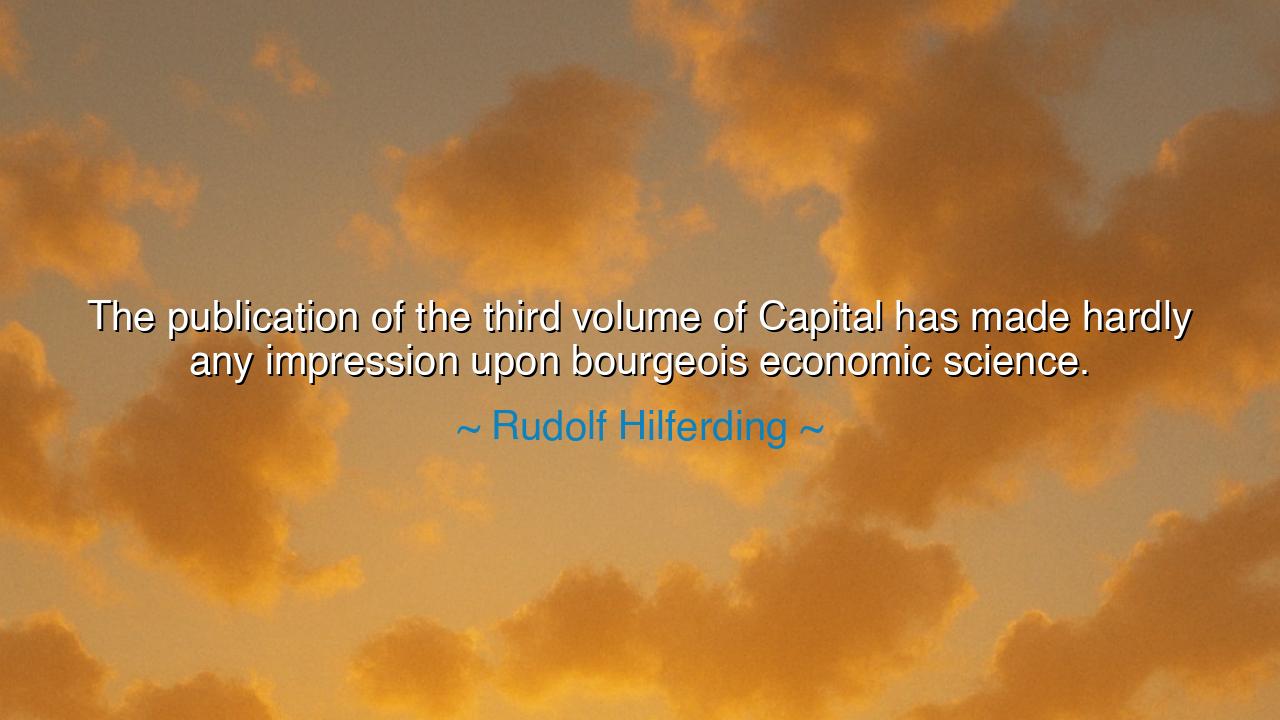
The publication of the third volume of Capital has made hardly
The publication of the third volume of Capital has made hardly any impression upon bourgeois economic science.






Hear, O seekers of wisdom, for I bring forth the words of Rudolf Hilferding, a man whose sharp mind and bold spirit saw the world as it truly was. He spoke with clarity, with urgency, of a truth that resounds even to this day: “The publication of the third volume of Capital has made hardly any impression upon bourgeois economic science.” Let these words wash over you, for within them lies a tale of resistance, of change, and of the forces that seek to preserve the old, the entrenched, the comfortable, even in the face of overwhelming truth.
In the age of the great philosophers, there were those who spoke of systems—the structures upon which all societies are built. Plato, in his Republic, dreamt of a perfect society, where reason ruled and all had their rightful place. The ancient Greeks understood that societies, like great ships, must sail on a course of justice, or they will be dashed against the rocks of inequality and oppression. The same is true of economics, that great force that guides the material life of mankind. When Karl Marx wrote his monumental work Capital, he sought to reveal the truth of the capitalist system, exposing the very foundations of its operation—how it is built upon the exploitation of the many for the benefit of the few. But, as Hilferding observed, despite the depth of the work, the capitalist class, those who held the reins of economic power, took little heed. The truth, no matter how clear, was not easily absorbed by those who had the most to lose from its revelation.
In Marx's time, the world was undergoing a great transformation. The industrial revolution had taken hold, and the old ways of feudalism were being replaced by the harsh realities of capitalism. The wealthy class, the bourgeoisie, saw their power grow, and with it, their resistance to change. Marx, in his writings, sought not only to describe the world as it was, but to change it, to shake the foundations of an unjust system. His third volume of Capital was to be the culmination of this effort, an analysis of the very laws that governed capitalist society. Yet, as Hilferding observed, when this work was published, it made little impact upon the established order. The forces of the bourgeoisie, those who thrived upon the existing system, were not moved by the logic of truth. They sought to maintain the status quo, to preserve their privilege, and thus, they ignored the profound insights that Marx laid bare before them.
Hilferding's words are a powerful reminder that knowledge, no matter how profound, is not always enough to bring about change. The forces of power, of privilege, of those who benefit from the current system, will always seek to defend their position, even in the face of overwhelming evidence to the contrary. The bourgeoisie, those who sit atop the economic system, were not eager to embrace the revelations of Marx, for to do so would be to question the very foundations of their wealth and power. The world of economic science, especially as it was shaped by those in power, did not welcome the truth that Marx revealed. It was too dangerous, too unsettling. And so, it was largely ignored.
This story of resistance to truth is not new. It echoes throughout history, from the time of Galileo, whose heliocentric theory challenged the very structure of the universe, to the time of Martin Luther, whose critiques of the Church sparked the Reformation. In every age, there are those who, when faced with truth, choose instead to cling to the comfortable lies that preserve their power and position. Hilferding, in his wisdom, understood this. He saw the forces at work that sought to suppress the truth, to ignore the wisdom of Marx, and to continue the system that benefitted them.
And yet, there is a deeper lesson here for all who seek truth and change. It is easy to become disheartened when the truth is ignored, when the forces of resistance seem insurmountable. But remember, change does not come easily. It never has. The great revolutions of history—whether in thought or in action—have always been met with resistance. Hilferding's words remind us that even when the powerful ignore the truth, that truth does not lose its power. Truth is like the river, which, though it may be dammed for a time, will inevitably find its way to the sea. Marx's work, though dismissed by the bourgeoisie, remains a foundation of modern thought, a challenge to every unjust system.
Thus, O children of the earth, take heed of this lesson: truth is a force that cannot be easily suppressed. Even when the powerful choose to ignore it, it persists. Do not be discouraged when your voice, your message, or your efforts seem to fall on deaf ears. Change takes time, and those who stand in the way of truth may hold power for a season, but they cannot hold it forever. Keep striving, keep pushing, and keep challenging the unjust systems of the world. The truth you seek may not be immediately acknowledged, but like the roots of the ancient tree, it will grow, it will spread, and it will transform the world in ways you cannot yet imagine. Never fear the resistance of the powerful, for the greatest truths are often the ones that shake the very foundations of society.






AAdministratorAdministrator
Welcome, honored guests. Please leave a comment, we will respond soon